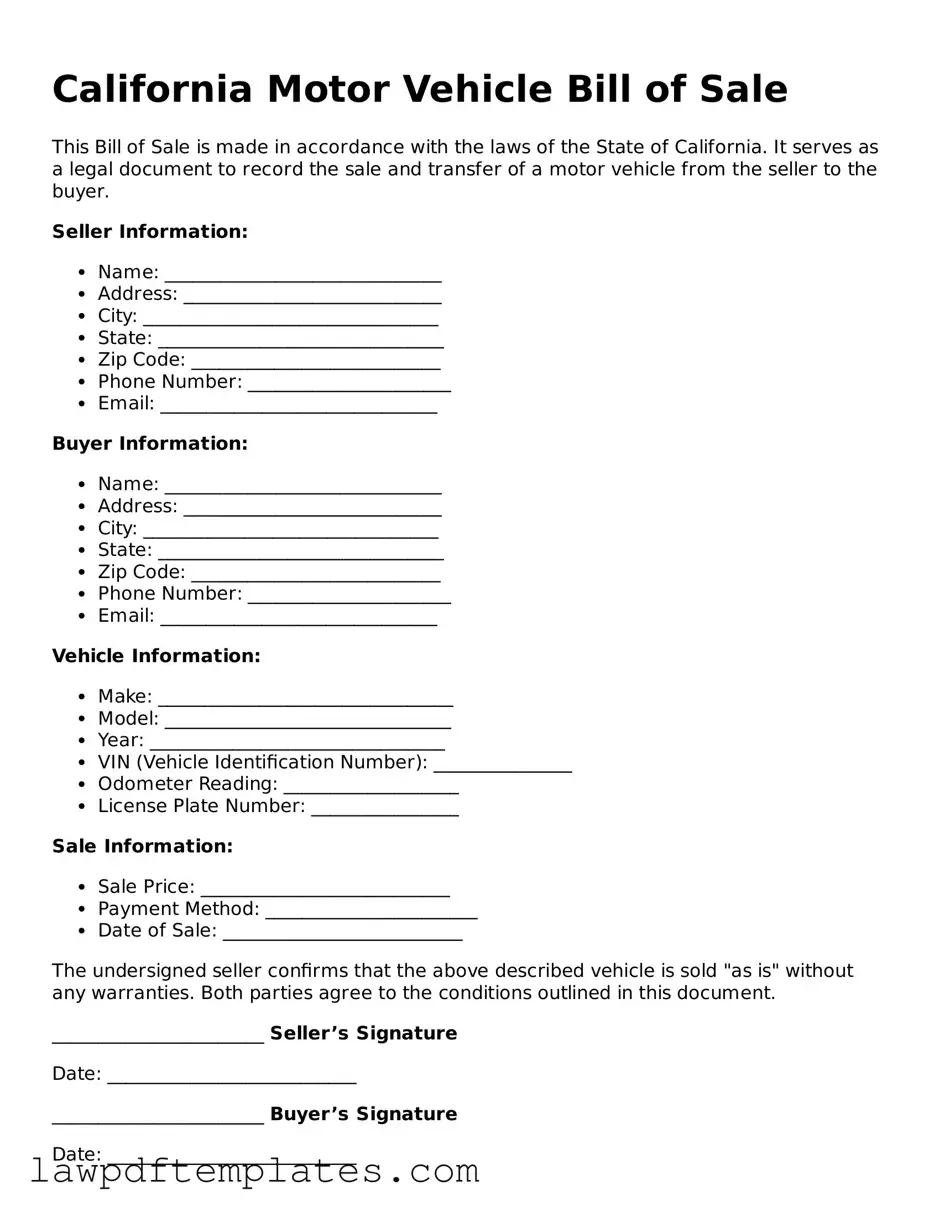Free Motor Vehicle Bill of Sale Template for the State of California
Form Breakdown
| Fact Name | Details |
|---|---|
| Purpose | The California Motor Vehicle Bill of Sale form is used to document the sale or transfer of a vehicle between parties. |
| Governing Law | This form is governed by California Vehicle Code Section 5901, which outlines the requirements for vehicle sales. |
| Information Required | The form requires details such as the vehicle identification number (VIN), make, model, year, and the names and addresses of the buyer and seller. |
| Notarization | While notarization is not mandatory for the Bill of Sale in California, it can provide additional legal protection for both parties. |
| Usage | This form is often used to register the vehicle with the California Department of Motor Vehicles (DMV) after the sale is completed. |
Sample - California Motor Vehicle Bill of Sale Form
California Motor Vehicle Bill of Sale
This Bill of Sale is made in accordance with the laws of the State of California. It serves as a legal document to record the sale and transfer of a motor vehicle from the seller to the buyer.
Seller Information:
- Name: ______________________________
- Address: ____________________________
- City: ________________________________
- State: _______________________________
- Zip Code: ___________________________
- Phone Number: ______________________
- Email: ______________________________
Buyer Information:
- Name: ______________________________
- Address: ____________________________
- City: ________________________________
- State: _______________________________
- Zip Code: ___________________________
- Phone Number: ______________________
- Email: ______________________________
Vehicle Information:
- Make: ________________________________
- Model: _______________________________
- Year: ________________________________
- VIN (Vehicle Identification Number): _______________
- Odometer Reading: ___________________
- License Plate Number: ________________
Sale Information:
- Sale Price: ___________________________
- Payment Method: _______________________
- Date of Sale: __________________________
The undersigned seller confirms that the above described vehicle is sold "as is" without any warranties. Both parties agree to the conditions outlined in this document.
_______________________ Seller’s Signature
Date: ___________________________
_______________________ Buyer’s Signature
Date: ___________________________
This Bill of Sale is an important legal record. Keep it in a safe place.
Common mistakes
Completing the California Motor Vehicle Bill of Sale form is a critical step in the process of buying or selling a vehicle. However, many individuals encounter common pitfalls that can lead to complications down the road. One frequent mistake is failing to include all required information. Buyers and sellers must ensure that they accurately fill in the vehicle's make, model, year, and Vehicle Identification Number (VIN). Omitting any of these details can render the document incomplete.
Another common error involves incorrect signatures. Both the seller and buyer must sign the form, and their signatures must match the names provided on the document. If there is a discrepancy, such as a nickname or a different version of a name, it may cause issues when registering the vehicle or transferring ownership.
Many people also overlook the importance of the date. The Bill of Sale must include the date of the transaction. Without this crucial detail, it can be challenging to establish the timeline of ownership, which is especially important for tax purposes and legal protection.
Additionally, some individuals neglect to provide the sale price of the vehicle. This figure is essential not only for the transaction itself but also for calculating sales tax. Leaving this blank or entering an incorrect amount can lead to complications when the buyer registers the vehicle with the Department of Motor Vehicles (DMV).
Another mistake often made is not having a witness present during the signing of the Bill of Sale. While California does not require a witness for the Bill of Sale to be valid, having one can add an extra layer of security and verification to the transaction. It can help prevent disputes that may arise later regarding the sale.
Furthermore, some individuals fail to keep a copy of the completed Bill of Sale. Both the buyer and seller should retain a copy for their records. This document serves as proof of the transaction and can be essential if any issues arise in the future regarding ownership or payment.
Lastly, not understanding the implications of the Bill of Sale can lead to significant misunderstandings. This document is not just a receipt; it serves as a legal record of the transfer of ownership. Buyers should be aware that once they sign the Bill of Sale, they assume responsibility for the vehicle, including any potential liabilities. Sellers, on the other hand, should ensure that they have fulfilled their obligations before transferring ownership.
Discover More Motor Vehicle Bill of Sale Templates for Specific States
Ohio Car Title - Sellers may include a declaration that there are no liens on the vehicle in the Bill of Sale.
To effectively support someone's application, consider utilizing a valuable essential Recommendation Letter template. This tool simplifies the process of gathering commendations, ensuring that you provide a well-rounded overview of the candidate's strengths and capabilities.
Do I Need Bill of Sale to Transfer Title - Essential for establishing a buyer's rights to the vehicle after sale.
Boat Bill of Sale Massachusetts - Digital copies can also be created for convenience.
